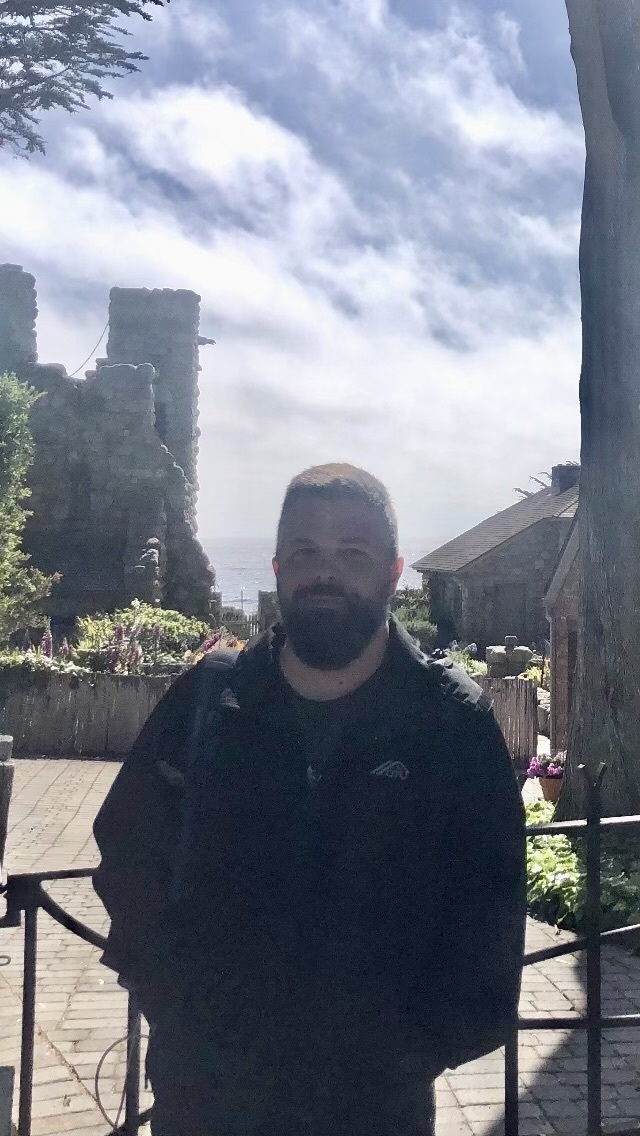Happy birthday to Robinson Jeffers (1887-1962), “inhumanist” poet of the central California coast. In one of the highlights of 2022 and possibly my life, we visited Tor House and Hawk Tower and got a personal tour. They ask visitors not to post any interior photos, so here I am standing outside the gate while we awaited our guide.

I have three birthdays of people unrelated to me on my calendar: Wendell Berry, J.R.R. Tolkien, and Robinson Jeffers. They are there because each writer’s unique vision has formed me in important ways.
If Wendell Berry is my icon for the close, domestic, and dear, then Robinson Jeffers is my icon for wild and indifferent nature. He is medicine for our innate, human egocentrism. He called his outlook “inhumanism” and described it like this:
It is based on a recognition of the astonishing beauty of things and their living wholeness, and on a rational acceptance of the fact that mankind is neither central nor important in the universe; our vices and blazing crimes are as insignificant as our happiness. We know this, of course, but it does not appear that any previous one of the ten thousand religions and philosophies have realized it. An infant feels himself to be central and of primary importance; an adult knows better; it seems time that the human race attained to an adult habit of thought in this regard. This attitude is neither misanthropic nor pessimist nor irreligious, though two or three people have said so, and may again; but it involves a certain detachment.
…
To sum up the matter:–“Love one another” is a high commandment, but it polarizes the mind; love on the surface implies hate in the depth,–(Dante who hated well because he loved)–as the history of Christendom bitterly proves. “Love one another” ought to be balanced, at least, by a colder saying,–this too a counsel of perfection, i.e., a direction-giver, a guide though it cannot be a rule,–“Turn away from each other,"–to that great presence of which humanity is only a squirming particle. To persons of Christian faith, if any should read this, I would point out that Jesus himself, intuitive master of psychology, invoked this balance. “Love your neighbor as yourself”–that is, not excessively, if you are adult and normal–but “God with all your heart, mind and soul.” Turn outward from each other, so far as need and kindness permit, to the vast life and inexhaustible beauty beyond humanity.
Our lives are so taken up with ourselves. We spends hours of each day talking to each other, watching and dreaming about each other. Jeffers, though, sitting atop his pile of sea-washed granite overlooking the Pacific, writes of hawks and storms and takes a long view of history. Reality is out there, beautiful and pitiless.
Credo
My friend from Asia has powers and magic, he plucks a blue leaf from the young blue-gum
And gazing upon it, gathering and quieting
The God in his mind, creates an ocean more real than the ocean, the salt, the actual
Appalling presence, the power of the waters.
He believes that nothing is real except as we make it. I humbler have found in my blood
Bred west of Caucasus a harder mysticism.
Multitude stands in my mind but I think that the ocean in the bone vault is only
The bone vault’s ocean; out there is the ocean’s;
The water is the water, the cliff is the rock, come shocks and flashes of reality. The mind
Passes, the eye closes, the spirit is a passage;
The beauty of things was born before eyes and sufficient to itself, the heart-breaking beauty
Will remain when there is no heart to break for it.